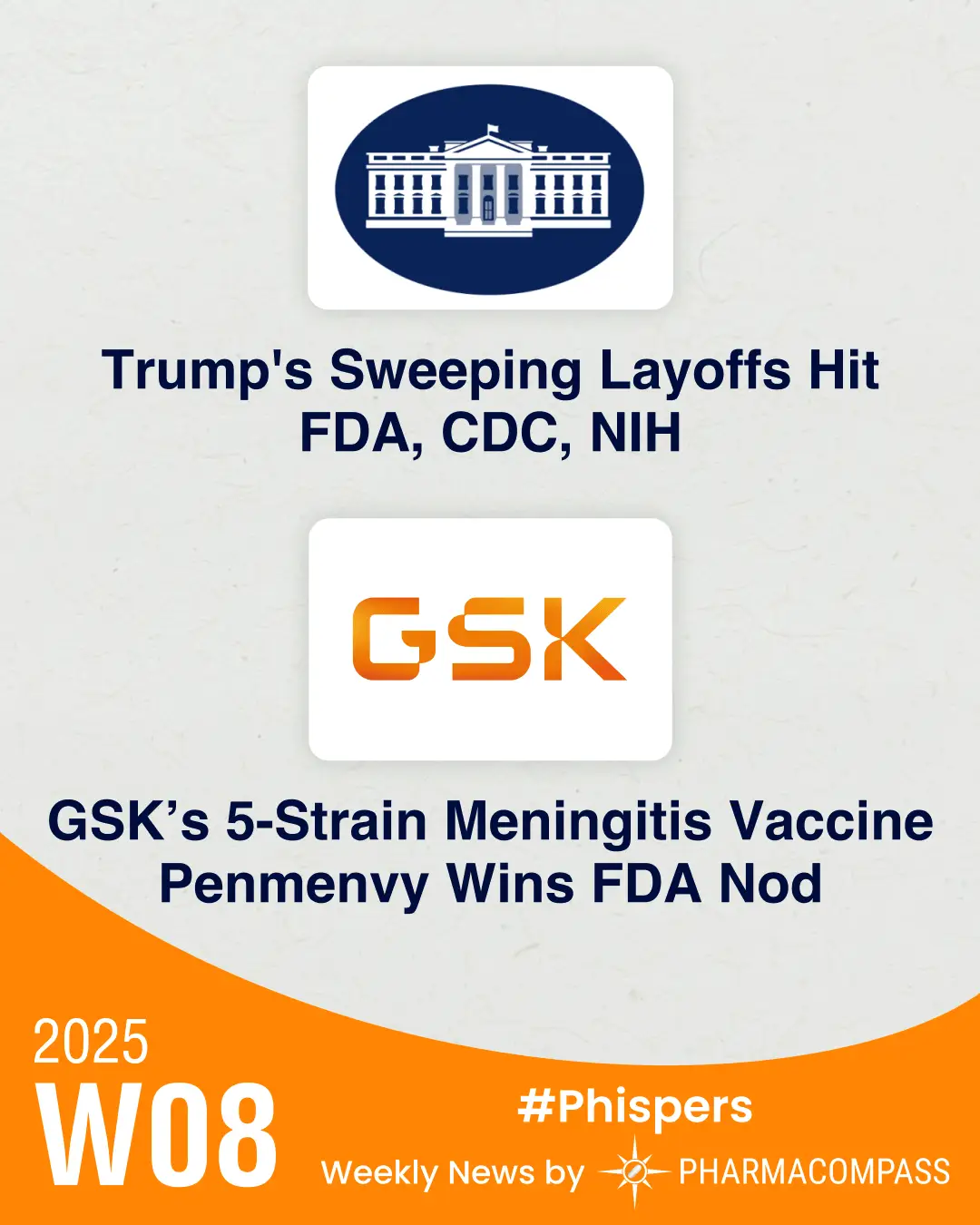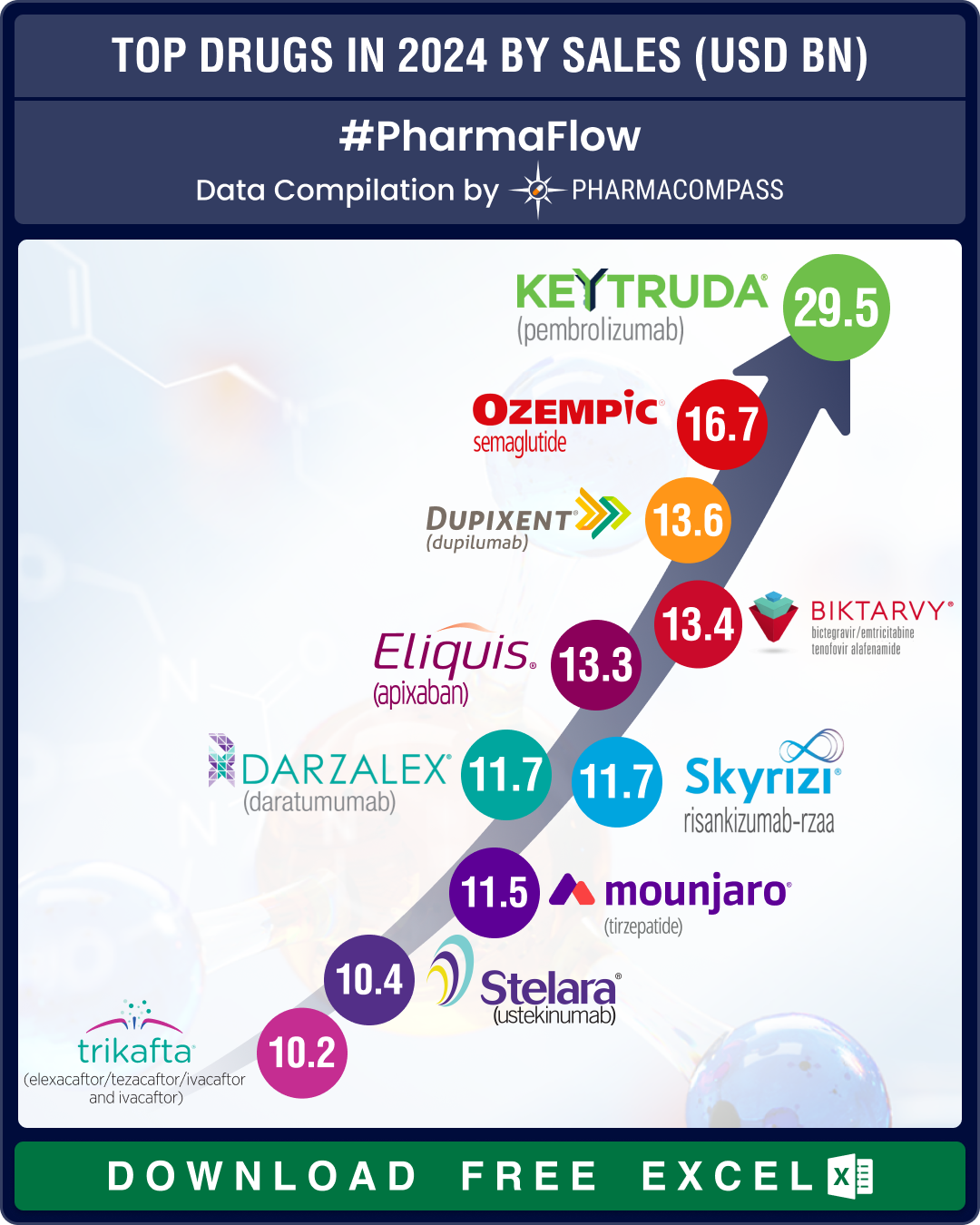
By PharmaCompass
2025-02-20
Impressions: 903 (Article) || 61 (Video)
In this week’s Phispers, we bring you news from the public health agencies in the US that have already witnessed considerable job cuts under the Trump administration. What’s worse, there is news that 5,200 employees across US health agencies are set to be fired. The head of US Food and Drug Administration’s food division has resigned over the administration’s “disdain for the very people” required to implement food safety reforms.
Novo Nordisk has alleged fraud in a US$ 1.3 billion deal it had signed in October 2023 with Singapore-headquartered KBP BioSciences to acquire a drug for uncontrolled hypertension with potential application in cardiovascular and kidney disease. Novo is seeking US$ 830 million in damages from KBP.
The US Food and Drug Administration (FDA) has approved GSK’s new five-in-one vaccine, Penmenvy, for individuals aged 10 to 25 years. It protects against five strains of the bacteria that cause invasive meningococcal disease—a rare but severe illness that can lead to life-threatening infections of the brain and bloodstream. The agency also approved Bavarian Nordic’s chikungunya vaccine, Vimkunya, for use in individuals aged 12 years and older. However, the FDA paused a phase 3 trial of Moderna’s experimental norovirus vaccine due to a rare neurological side effect.
In drug approvals, the FDA has okayed Ono Pharmaceutical’s Romvimza (vimseltinib) for treating tenosynovial giant cell tumor (TGCT), a rare condition that affects joints. Ono had acquired Romvimza through its US$ 2.4 billion buyout of Deciphera Pharmaceuticals.
US health agencies brace for more layoffs as RFK Jr takes helm at HHS; FDA’s food unit head quits
After Robert F. Kennedy Jr. was confirmed as Secretary of Health and Human Services (HHS), staff at key US public health agencies braced for major cuts.
The Trump administration has already cut jobs amid a sweeping shakeup. Approximately 1,300 employees—or 10 percent of its workforce—are being let go at the Centers for Disease Control and Prevention (CDC). The CDC, with a budget of US$ 9.7 billion for fiscal year 2025, is tasked with responding to infectious diseases, public health emergencies like the Covid-19 pandemic, and protecting against other leading causes of illness and death.
Similarly, up to 1,500 workers have been laid off at the National Institutes of Health (NIH), the world’s largest public funder of biomedical research. The NIH employs over 18,000 people and supports nearly US$ 48 billion in research outside its own walls.
STAT News reported that the Trump administration was set to fire about 5,200 employees across US health agencies. The move has been dubbed by workers as the “Valentine’s Day massacre.”
The FDA, including its Center for Devices and Radiological Health (CDRH), has also been affected as reductions have hit staff in user-fee-funded activities, such as reviewing medical products for clearance and approval.
In a dramatic move, the head of the FDA’s food division has quit, citing “indiscriminate” layoffs across the agency and the Trump admin’s “disdain for the very people” required to implement food safety reforms.
Novo goes to court, alleging fraud in US$ 1.3 bn kidney med deal with Singapore-based KBP
Novo Nordisk has alleged fraud, and wants its money back from Singapore-headquartered KBP BioSciences, a biotech with which it had signed a US$ 1.3 billion deal in October 2023 to buy ocedurenone.
The drug, meant for uncontrolled hypertension with potential application in cardiovascular and kidney disease, failed phase 3 clinical trials, and Novo had to toss it out of its pipeline. Novo is seeking up to US$ 830 million, alleging it had been misled by KBP back in 2023. Novo Nordisk will launch arbitration proceedings against KBP in New York.
At the request of Novo Nordisk, the Singapore International Commercial Court has ordered the freezing of worldwide assets of KBP and its founder Huang Zhenhua, a Reuters report said.
FDA clears GSK’s Penmenvy, new 5-strain meningitis vaccine for young adults
FDA has approved GSK’s new combination vaccine, Penmenvy, for individuals aged 10 to 25 years. This five-in-one vaccine protects against five strains of the bacteria Neisseria meningitidis, the culprit behind invasive meningococcal disease — a rare but severe illness that can lead to life-threatening infections of the brain and bloodstream. By combining the protective components of two existing vaccines into one shot, Penmenvy reduces the number of injections needed.
Bavarian’s chikungunya shot nabs approval: FDA has greenlit Bavarian Nordic’s chikungunya vaccine, Vimkunya, for use in individuals aged 12 years and older. Vimkunya is a virus-like particle (VLP) vaccine, meaning it mimics the chikungunya virus to stimulate a strong immune response without causing the disease.
Moderna to pause norovirus vaccine trial: The FDA has paused a phase 3 trial of Moderna’s experimental norovirus vaccine due to a rare neurological side effect, known as Guillain-Barre syndrome. There was a single case of this adverse event, which is currently under investigation. The late-stage study is evaluating the candidate, dubbed mRNA-1403, across two norovirus seasons.
Ono’s US$ 2.4 bn Deciphera buyout bears fruit, as FDA okays joint tumor drug Romvimza
FDA has approved Ono’s Romvimza (vimseltinib) for treating tenosynovial giant cell tumor (TGCT), a rare condition that affects joints. With this approval, adults who face severe joint problems from this tumor now have a new treatment option when surgery might worsen their condition. Ono acquired Romvimza and other cancer drugs via its US$ 2.4 billion Deciphera Pharmaceuticals buyout. This sets up competition with fellow Japanese drugmaker Daiichi Sankyo’s Turalio (pexidartinib), the only other FDA-approved systemic treatment for TGCT.
Merck inks oncology deal with Epitopea; Radiance picks ADC asset from Chinese biotech
Merck has inked a research collaboration agreement with biotech firm Epitopea, aiming to uncover “hidden” tumor antigens that may hold the key to breakthrough cancer therapies. Under the deal, Merck will pay an undisclosed upfront fee, with milestone payments that could total up to US$ 300 million per product. Epitopea will use its proprietary platform to identify these antigens.
Radiance buys ADC asset: Radiance BioPharma is acquiring an antibody–drug conjugate (ADC) asset from China’s CSPC Megalith Biopharmaceutical. The ADC targets ROR1, or receptor tyrosine kinase-like orphan receptor 1, a protein that plays a role in embryonic development and cancer. The deal includes US$ 15 million in an upfront payment, and over US$ 1 billion in various milestone payments.
The PharmaCompass Newsletter – Sign Up, Stay Ahead
Feedback, help us to improve. Click here
Image Credit : Phisper Infographic by PharmaCompass license under CC BY 2.0
“ The article is based on the information available in public and which the author believes to be true. The author is not disseminating any information, which the author believes or knows, is confidential or in conflict with the privacy of any person. The views expressed or information supplied through this article is mere opinion and observation of the author. The author does not intend to defame, insult or, cause loss or damage to anyone, in any manner, through this article.”








